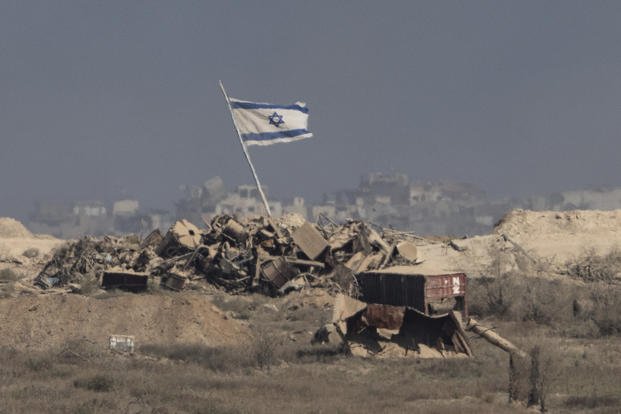Israel has issued a stark warning that the evacuation of Gaza City is “inevitable” as the region faces intensifying military pressure. This statement comes ahead of critical US-led post-war negotiations aimed at addressing the humanitarian and political fallout of the ongoing conflict. The announcement has sent shockwaves through the already strained civilian population, raising urgent questions about displacement, safety, and the broader prospects for peace in the region.
The declaration reflects the deepening challenges of balancing military objectives with humanitarian obligations. Civilians in Gaza City, home to over two million residents, are now confronted with the possibility of forced evacuation amid a volatile security environment.
The Inevitable Evacuation: Context and Implications
Gaza City, one of the most densely populated urban centers in the world, has been at the center of repeated military operations over recent years. The Israeli military’s statement that evacuation is “inevitable” signals a potential intensification of operations aimed at securing strategic targets within the city.
Experts warn that such an evacuation could have profound humanitarian consequences. “Mass displacement in Gaza City could result in a catastrophic humanitarian situation,” says Dr. Leila Hassan, a Middle East conflict analyst. “Basic services are already under strain, and relocating such a large population would be an enormous logistical and ethical challenge.”
For Israel, the evacuation is framed as a necessary measure to protect civilians from the escalating military conflict. However, critics argue that the scale and timing of such an operation could exacerbate suffering rather than mitigate it.
US-Led Post-War Talks: A Fragile Opportunity
The evacuation warning coincides with preparations for US-led post-war discussions designed to chart a path toward stability in the region. Washington has emphasized the need for inclusive negotiations, focusing on humanitarian aid, reconstruction, and security arrangements.
While details remain fluid, officials suggest that evacuation plans are a key consideration in these talks. The US is expected to engage with both Israeli authorities and Palestinian representatives to establish protocols that minimize civilian harm while addressing Israel’s security concerns.
Diplomats are acutely aware of the delicate balance between operational military requirements and the need for post-conflict reconciliation. “Any post-war agreement must consider the human dimension,” notes Ambassador Thomas Green, a veteran negotiator in Middle East affairs. “Ignoring civilian safety in Gaza City could derail peace initiatives before they even begin.”
Humanitarian Impact: Civilian Lives at Risk
The prospect of mass evacuation in Gaza City underscores the severe humanitarian challenges facing the population. Residents may be forced to leave homes with limited access to transportation, food, water, and medical care. Hospitals and clinics, already strained by ongoing conflict, may struggle to operate under these conditions.
Humanitarian organizations are urgently calling for contingency planning to ensure the safety of civilians. Relief agencies are preparing shelters, medical supplies, and evacuation logistics to support those displaced by military operations. Yet, the scale of the operation raises concerns about capacity and effectiveness.
Children and the elderly are particularly vulnerable. Psychological trauma, coupled with physical displacement, could have long-lasting effects on the community. Experts warn that inadequate preparation may result in increased mortality, malnutrition, and disease outbreaks.
Military Considerations: Strategic Calculations
Israel’s declaration of inevitable evacuation is rooted in military strategy. Gaza City contains key infrastructure and dense urban areas that complicate operational objectives. Evacuating civilians could allow for more precise targeting of military operations while reducing the risk of civilian casualties.
Military analysts note that urban warfare presents unique challenges. Dense populations, narrow streets, and complex building layouts increase the risk to both civilians and combatants. “Evacuations are often seen as a precondition for safer operations,” explains Colonel David Levin, a retired military strategist. “However, the practical execution in a city of this size is incredibly challenging.”
Political Dimensions: Balancing Security and Diplomacy
The evacuation issue carries significant political weight. Israel faces domestic and international scrutiny over its military tactics, while Palestinian leadership is under pressure to protect its citizens. The US-led talks are seen as a potential avenue to reconcile these competing pressures, but the timeline is tight.
Regional actors, including Egypt and Jordan, have expressed concern over the humanitarian implications of mass displacement. Diplomatic channels are exploring options for temporary relocation centers, safe passage corridors, and international monitoring to ensure accountability during the evacuation process.
The intersection of security imperatives and political considerations illustrates the complexity of decision-making in conflict zones. Actions taken now will influence post-war negotiations, regional stability, and Israel’s international standing.
Voices from the Ground: Civilian Perspectives
Residents of Gaza City are expressing a mixture of fear, frustration, and uncertainty. Many report difficulty accessing basic necessities even before the evacuation announcement. “We don’t know where we will go, and we don’t know if it will be safe,” says Mariam Abu Khalil, a local teacher. “Every day is a struggle, and now the threat of forced evacuation adds to our fear.”
Local humanitarian workers stress the urgency of preparation. Community leaders are coordinating with relief agencies to identify evacuation routes, shelters, and essential resources. Despite these efforts, logistical and security challenges make the operation highly precarious.
International Response: Calls for Caution
Global leaders have expressed concern over the potential humanitarian fallout. The United Nations has urged Israel to implement any evacuation in strict accordance with international law, emphasizing protection for civilians.
European and Arab nations have called for transparent planning, coordination with relief organizations, and adherence to safety protocols. “Evacuations must not become a secondary source of suffering,” cautions a UN spokesperson. “We urge all parties to prioritize the protection of human life.”
The international community is closely watching the US-led talks, which are expected to provide frameworks for post-conflict recovery and stabilization. How Israel implements evacuation plans could have lasting implications for regional diplomacy and international relations.
FAQs
Why is Israel labeling Gaza City evacuation as ‘inevitable’?
Israel cites military necessity and the dense urban environment as reasons for the evacuation, aiming to reduce civilian casualties during intensified operations.
How will this affect civilians in Gaza City?
Residents face displacement, limited access to essential services, and heightened vulnerability, particularly children, the elderly, and those with medical needs.
What role will US-led post-war talks play?
The talks aim to create frameworks for humanitarian relief, security, and reconstruction. Evacuation planning is a central topic to ensure civilian protection during military operations.
What measures are being taken to support displaced civilians?
Humanitarian agencies are preparing shelters, evacuation routes, and medical support, but logistical challenges remain significant due to the city’s size and density.
How could this impact regional stability?
Mass displacement and civilian suffering could trigger wider political repercussions, influence Israel’s international relations, and affect post-war negotiations across the Middle East.
Do you want me to do that? What role will US-led post-war talks play?
The talks aim to create frameworks for humanitarian relief, security, and reconstruction. Evacuation planning is a central topic to ensure civilian protection during military operations.
What measures are being taken to support displaced civilians?
Humanitarian agencies are preparing shelters, evacuation routes, and medical support, but logistical challenges remain significant due to the city’s size and density.
How could this impact regional stability?
Mass displacement and civilian suffering could trigger wider political repercussions, influence Israel’s international relations, and affect post-war negotiations across the Middle East.
Conclusion:
Israel’s declaration that Gaza City evacuation is inevitable marks a critical juncture in the ongoing conflict. The announcement highlights the urgent need for careful planning, international coordination, and humanitarian oversight.
As US-led post-war talks approach, the balance between military objectives and civilian safety remains delicate. The coming days will test the ability of all stakeholders to prevent further human suffering while navigating complex political and strategic considerations.
For Gaza City residents, the uncertainty of evacuation compounds daily hardships, making relief, protection, and clear communication essential. The effectiveness of humanitarian planning and diplomatic negotiation will shape not only the immediate outcome of evacuation but also the long-term prospects for peace and stability in the region.











